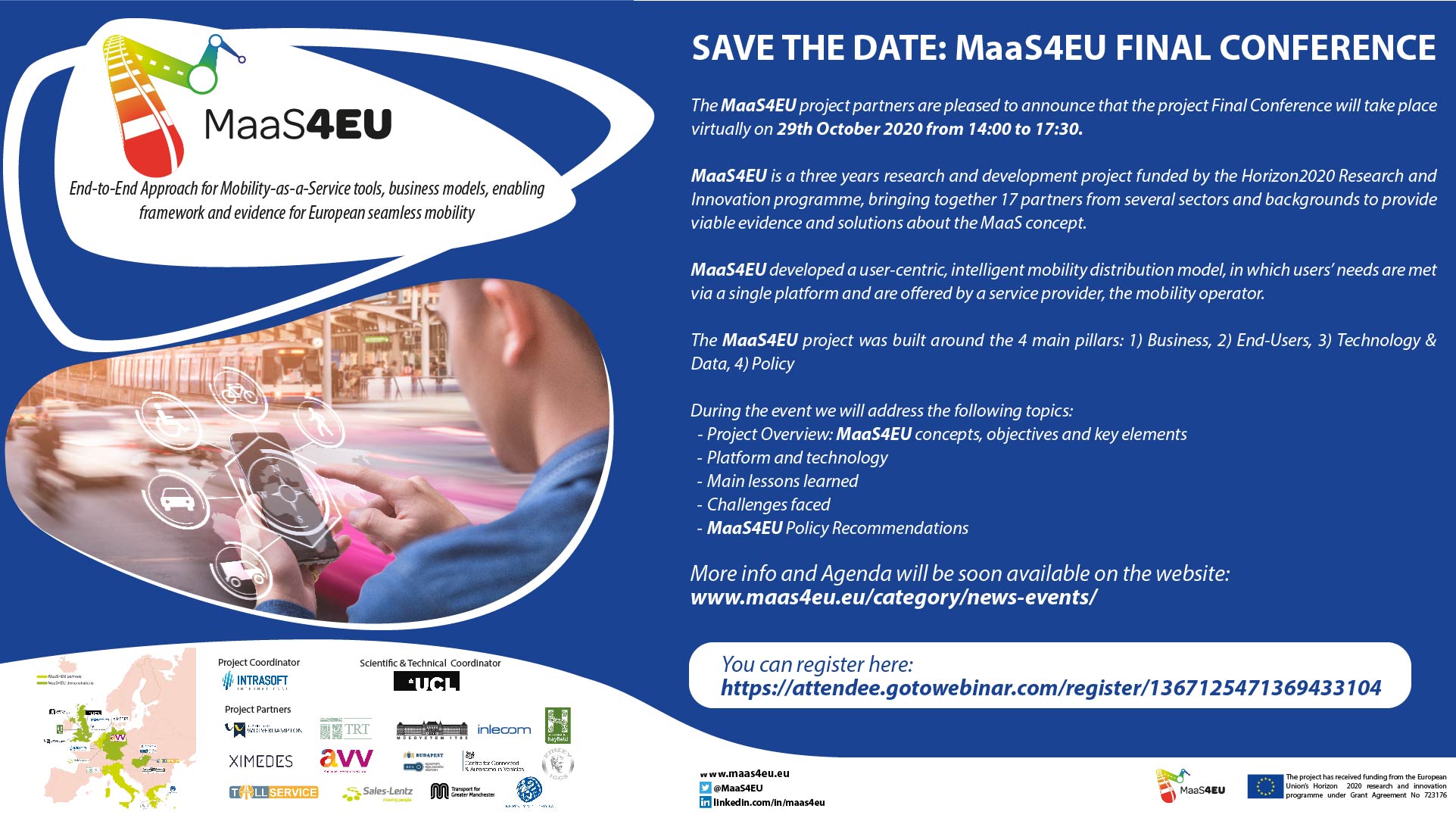The Final Conference took place virtually on the 29th of October 2020. The dissemination campaign through the different MaaS4EU channels, including Facebook, Tweeter, e-mails as well the ELTIS portal, started four weeks before the event. As a result, 127 people were registered and 72 made it to participate to the event.
The Event started with the welcome and introductory message of Claudia Ciuca, Policy Officer from INEA, European Commission. Afterwards, Akrivi Vivian Kiousi from Intrasoft International and Maria Kamargianni from University College of London, respectively project coordinator and scientific and technical coordinator, introduced the MaaS4EU project vision, objectives and some preliminary key achievement and outcomes. To end this introductory first block, Panagiotis Georgakis, from the University of Wolverhampton, described the technical architecture behind the project and presented the MaaS4EU platform with its functionalities.
During the second hour, the three MaaS4EU pilots were presented. First, a brief introduction was done by Jakub Muscat from the University College of London. The different pilots, Budapest, Manchester and Luxembourg, were presented by Viktoria Siklova, Sam Li and Charalampos Ipektsidis respectively.
The first one was Budapest, launched in September, where 338 new users were registered and 51 mobility packages distributed. The Manchester and Luxembourg pilots were run virtually instead. This was mostly due to the COVID-19 mobility restrictions. In the case of Luxembourg, the pilot was also affected by the decision of the government to run the public transport in Luxembourg for free as from 2020.
After the pilots presentation, Ioanna Pagoni from the University of Aegean described the MaaS ecosystem and involved actors, the potential governance models for MaaS, the potential barriers and enablers for MaaS actors to implement or join MaaS, as well as MaaS Business Models considering Products and Pricing. Later on, Maria Kamargianni presented the MaaS4EU project results, highlighting the three pilots’ main outcomes, the main challenges based on the project results and the main lessons learned at the end of the 41 months of the project.
Finally, during the last 30 min, Akrivi Vivian Kiousi presented the outcomes of an in-depth analysis concerning policy aspects as results from interviews to relevant stakeholders in different European cities.
All the presentations and the video recording of the MaaS4EU Final Conference are available on the Download area and the Media gallery section of this website. Presentations can be also download by clicking on the different topics of the table below.
Full video of the MaaS4EU Final Event
Agenda of the MaaS4EU Final Event
Time |
Topic |
Speaker |
Contents/notes |
| 10 m | Welcome | Claudia Ciuca (Project Officer – INEA) | – Welcome message from European Commission |
| 40 m | Intro |
Akrivi Vivian Kiousi (INTRASOFT International) Maria Kamargianni (Head of MaaSLab | University College of London) |
– MaaS4EU project overview – MaaS4EU concepts, objectives and key elements |
| 20 m | Platform and technology |
Panagiotis Georgakis (University of Wolverhampton) |
– MaaS4EU platform overview: different elements and app-demo |
| 5 m | Brief Intro of the Pilots |
Jakub Muscat (University College of London) |
– Luxembourg, Budapest and Manchester Pilot: MaaS4EU pilot cases |
| 20 m | Pilot 1 Budapest |
Viktória Siklósi (Toll Service) |
– Pilot implementation summary: the main steps toward the implementation of the MaaS ecosystem – Exploring the 4 pillars: Business, End-users, Technology, Policy |
| 20 m |
Sam Li (TFGM) Ronald Strube (HSTL) |
||
| 20 m | Pilot 3 Luxembourg |
Eric Zorn (Sales-Lentz) |
|
| 20 m | Business Models |
Ioanna Pagoni (University of AEGEAN) |
– MaaS4EU a detailed view on the business model: key findings |
| 30 m | Outcomes, Challenges, Lessons Learned |
Maria Kamargianni (Head of MaaSLab | University College of London) |
– MaaS4EU pilots’ main outcomes – Major challenges based on MaaS4EU project results – Main lessons learned |
| 25 m | Policy Recommendations Closing |
Akrivi Vivian Kiousi (INTRASOFT International) |
– Next steps for MaaS – MaaS4EU Policy Recommendations – MaaS Exploitation |





